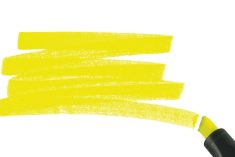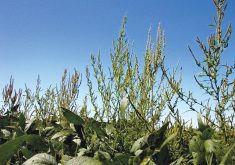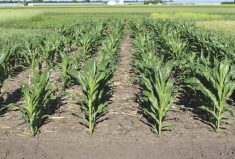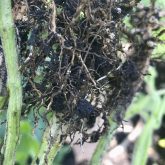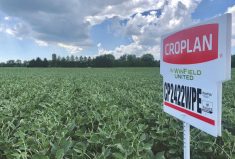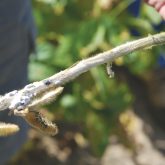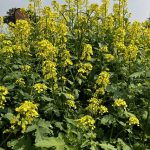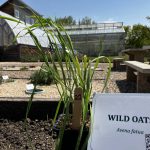The 2017 growing season has yielded an interesting trend which few seem to be aware of. Acres planted to soybeans in Canada reached a new high for this year at 7.3 million, an increase of 33.2 per cent from 2016. Those numbers from Statistics Canada have been something of a surprise for some, especially considering planted corn acres were cited at 3.6 million across the country.
Ontario continues to lead in soybean acreage with 3.1 million, but Manitoba, at 2.3 million acres seeded, isn’t far behind. The same type of race is taking shape between Quebec and Saskatchewan, where the former planted 983,500 acres in 2017, with the latter seeding 850,000, an extraordinary jump of 254 per cent over 2016.
Read Also

How scientists are using DNA and climate data to breed crops of the future
A method for forecasting how crops will perform in different environments so that plant breeders can quickly select the best parents for new, climate-resilient varieties.
It’s only speculation but there are sources in Western Canada who believe that prairie seeding of soybeans will top out somewhere around the 7.0 million-acre mark within the next five to 10 years. If Manitoba and Saskatchewan growers keep increasing by 40 to 250 per cent per year, that lofty acreage level might come sooner rather than later.
The picture for IP soybean varieties, however, may depend on continued growth in the traited crop’s acreage. Although seed dealers, commodity buyers and company representatives are challenged in finding growers who want to produce IP soybeans under contract, there is still plenty of room for optimism. Regardless of any simplicity or convenience in growing traited varieties, there are always growers looking for an opportunity to add value, which is where IP varieties come into the picture.
(Legend – CHU: crop heat units; RM: relative maturity; SCN: soybean cyst nematode.)
Dow Seeds
DS101C0 (CHU 2775, RM 1.0): This is a new conventional soybean with yellow hilum, large seed and higher-than-average protein. It provides good emergence and brown stem rot tolerance and is a viable option for the IP market.
PROSeeds Sevita International
Meteor (CHU 2450 to 2500): This medium-height plant is a slender variety that will perform best in narrow rows. It will yield in all soil types but prefers silt loam. This variety has average white mould tolerance and a good disease package including brown stem rot (BSR).
Panorama (CHU 2600 to 2650): This is a variety with great early-season vigour that will branch out to fill wider rows. It is ideal for a fertile, no-till situation or on clay soils. It’s also a good variety for yield and premium potential.
Genesis (CHU 2750 to 2800): This variety has great yield potential that has an opportunity for a premium. It is a medium-height variety that will travel from sandy loam to clay soils, and has very good vigour and prefers wider rows.
Tala (CHU 2750 to 2800): This is a contract variety for a specific end-use market. It is a tall, semi-bushy variety suited for loam or clay loam soils where standability may be an issue. It has very good white mould tolerance.
Skyline (CHU 2800 to 2850): This is a variety that has a SCN resistance and will perform in 15-inch row spacing very well. It has good standability with a very good disease package including good Phytophthora root rot and brown stem rot tolerances.
Azalea (CHU 2900 to 2950): This is a high-yielding soybean that should be placed in heavier soils. A semi-bushy plant with medium stature, it also offers good vigour for no till or a reduced tillage situation.
Syngenta
S10-R2 (CHU 2800, RM 1.0): This is a new, high-yielding, stress-tolerant NK brand soybean variety that offers excellent yields on tough acres and great food-grade qualities. This variety is a tall, bushy plant-type that canopies quickly, and has a great root disease package for a strong early season start.
S14-H3 (CHU 2850, RM 1.4): Excellent food-grade characteristics and consistent yields across variable environments make this new NK variety a versatile choice for growers. It has excellent standability, which lends the plant an attractive field appearance. It also provides strong SCN protection for critical maturity.




